英语中几大从句的用法总结
- 格式:doc
- 大小:49.50 KB
- 文档页数:12
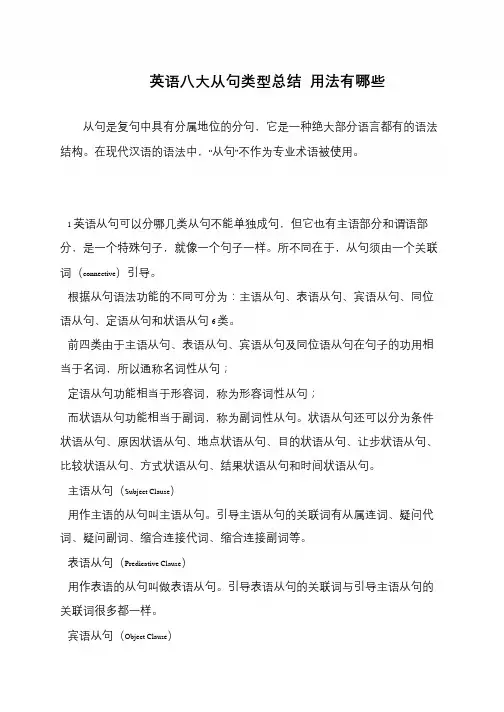
英语八大从句类型总结用法有哪些
从句是复句中具有分属地位的分句,它是一种绝大部分语言都有的语法结构。
在现代汉语的语法中,“从句”不作为专业术语被使用。
1 英语从句可以分哪几类从句不能单独成句,但它也有主语部分和谓语部分,是一个特殊句子,就像一个句子一样。
所不同在于,从句须由一个关联词(connective)引导。
根据从句语法功能的不同可分为:主语从句、表语从句、宾语从句、同位语从句、定语从句和状语从句6 类。
前四类由于主语从句、表语从句、宾语从句及同位语从句在句子的功用相当于名词,所以通称名词性从句;
定语从句功能相当于形容词,称为形容词性从句;
而状语从句功能相当于副词,称为副词性从句。
状语从句还可以分为条件状语从句、原因状语从句、地点状语从句、目的状语从句、让步状语从句、比较状语从句、方式状语从句、结果状语从句和时间状语从句。
主语从句(Subject Clause)
用作主语的从句叫主语从句。
引导主语从句的关联词有从属连词、疑问代词、疑问副词、缩合连接代词、缩合连接副词等。
表语从句(Predicative Clause)
用作表语的从句叫做表语从句。
引导表语从句的关联词与引导主语从句的关联词很多都一样。
宾语从句(Object Clause)。
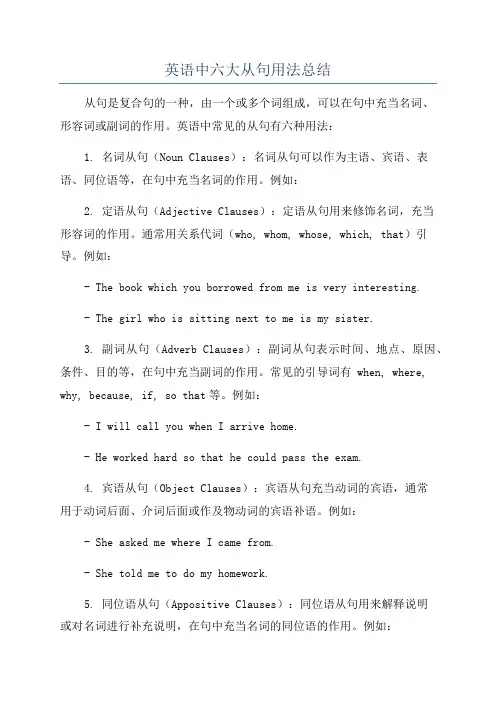
英语中六大从句用法总结从句是复合句的一种,由一个或多个词组成,可以在句中充当名词、形容词或副词的作用。
英语中常见的从句有六种用法:1. 名词从句(Noun Clauses):名词从句可以作为主语、宾语、表语、同位语等,在句中充当名词的作用。
例如:2. 定语从句(Adjective Clauses):定语从句用来修饰名词,充当形容词的作用。
通常用关系代词(who, whom, whose, which, that)引导。
例如:- The book which you borrowed from me is very interesting.- The girl who is sitting next to me is my sister.3. 副词从句(Adverb Clauses):副词从句表示时间、地点、原因、条件、目的等,在句中充当副词的作用。
常见的引导词有 when, where, why, because, if, so that等。
例如:- I will call you when I arrive home.- He worked hard so that he could pass the exam.4. 宾语从句(Object Clauses):宾语从句充当动词的宾语,通常用于动词后面、介词后面或作及物动词的宾语补语。
例如:- She asked me where I came from.- She told me to do my homework.5. 同位语从句(Appositive Clauses):同位语从句用来解释说明或对名词进行补充说明,在句中充当名词的同位语的作用。
例如:- The fact that he passed the exam surprised me.6. 让步从句(Concession Clauses):让步从句表示与主句相反或与主句相比是让步的关系,通常用连词(although, though, even though, while, despite, in spite of)引导。
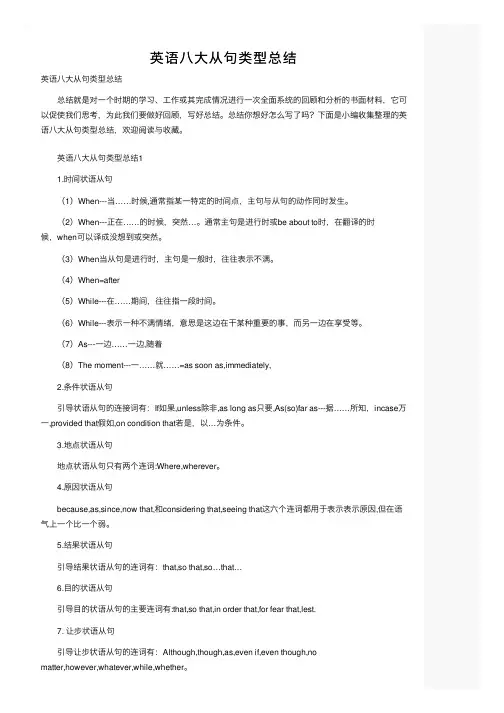
英语⼋⼤从句类型总结英语⼋⼤从句类型总结 总结就是对⼀个时期的学习、⼯作或其完成情况进⾏⼀次全⾯系统的回顾和分析的书⾯材料,它可以促使我们思考,为此我们要做好回顾,写好总结。
总结你想好怎么写了吗?下⾯是⼩编收集整理的英语⼋⼤从句类型总结,欢迎阅读与收藏。
英语⼋⼤从句类型总结1 1.时间状语从句 (1)When---当……时候,通常指某⼀特定的时间点,主句与从句的动作同时发⽣。
(2)When---正在……的时候,突然…。
通常主句是进⾏时或be about to时,在翻译的时候,when可以译成没想到或突然。
(3)When当从句是进⾏时,主句是⼀般时,往往表⽰不满。
(4)When=after (5)While---在……期间,往往指⼀段时间。
(6)While---表⽰⼀种不满情绪,意思是这边在⼲某种重要的事,⽽另⼀边在享受等。
(7)As---⼀边……⼀边,随着 (8)The moment---⼀……就……=as soon as,immediately, 2.条件状语从句 引导状语从句的连接词有:If如果,unless除⾮,as long as只要,As(so)far as---据……所知,incase万⼀,provided that假如,on condition that若是,以…为条件。
3.地点状语从句 地点状语从句只有两个连词:Where,wherever。
4.原因状语从句 because,as,since,now that,和considering that,seeing that这六个连词都⽤于表⽰表⽰原因,但在语⽓上⼀个⽐⼀个弱。
5.结果状语从句 引导结果状语从句的连词有:that,so that,so…that… 6.⽬的状语从句 引导⽬的状语从句的主要连词有:that,so that,in order that,for fear that,lest. 7. 让步状语从句 引导让步状语从句的连词有:Although,though,as,even if,even though,nomatter,however,whatever,while,whether。
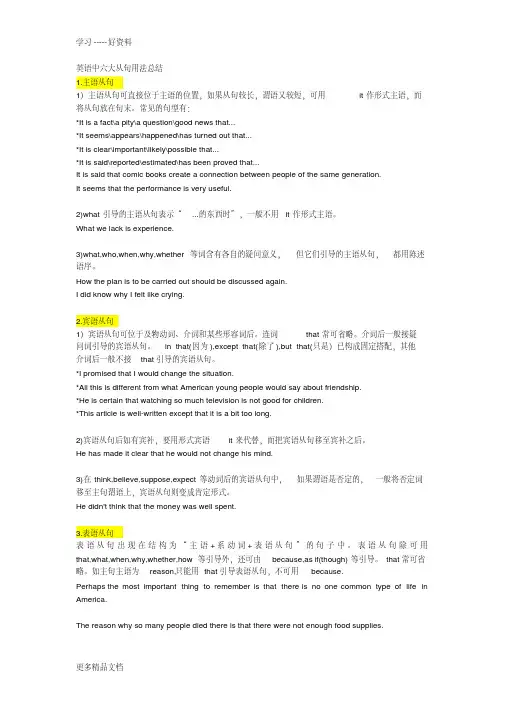
英语中六大从句用法总结1.主语从句1)主语从句可直接位于主语的位置,如果从句较长,谓语又较短,可用it作形式主语,而将从句放在句末。
常见的句型有:*It is a fact\a pity\a question\good news that...*It seems\appears\happened\has turned out that...*It is clear\important\likely\possible that...*It is said\reported\estimated\has been proved that...It is said that comic books create a connection between people of the same generation.It seems that the performance is very useful.2)what引导的主语从句表示“...的东西时”,一般不用it作形式主语。
What we lack is experience.3)what,who,when,why,whether等词含有各自的疑问意义,但它们引导的主语从句,都用陈述语序。
How the plan is to be carried out should be discussed again.I did know why I felt like crying.2.宾语从句1)宾语从句可位于及物动词、介词和某些形容词后。
连词that常可省略。
介词后一般接疑问词引导的宾语从句。
in that(因为),except that(除了),but that(只是)已构成固定搭配,其他介词后一般不接that引导的宾语从句。
*I promised that I would change the situation.*All this is different from what American young people would say about friendship.*He is certain that watching so much television is not good for children.*This article is well-written except that it is a bit too long.2)宾语从句后如有宾补,要用形式宾语it来代替,而把宾语从句移至宾补之后。
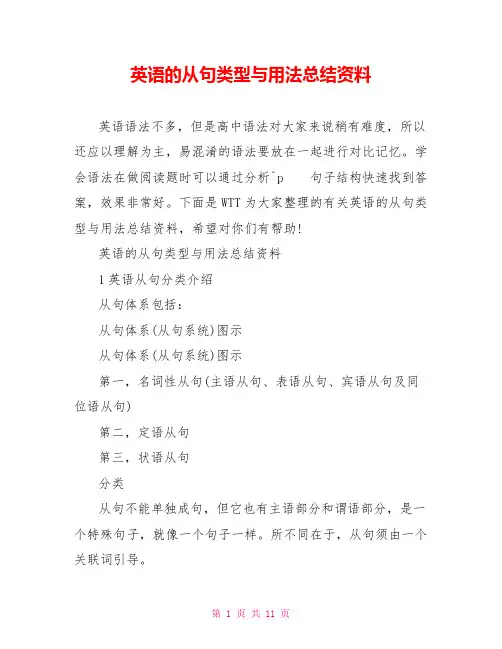
英语的从句类型与用法总结资料英语语法不多,但是高中语法对大家来说稍有难度,所以还应以理解为主,易混淆的语法要放在一起进行对比记忆。
学会语法在做阅读题时可以通过分析^p 句子结构快速找到答案,效果非常好。
下面是WTT为大家整理的有关英语的从句类型与用法总结资料,希望对你们有帮助!英语的从句类型与用法总结资料1英语从句分类介绍从句体系包括:从句体系(从句系统)图示从句体系(从句系统)图示第一,名词性从句(主语从句、表语从句、宾语从句及同位语从句)第二,定语从句第三,状语从句分类从句不能单独成句,但它也有主语部分和谓语部分,是一个特殊句子,就像一个句子一样。
所不同在于,从句须由一个关联词引导。
根据从句语法功能的不同可分为:主语从句、表语从句、宾语从句、同位语从句、定语从句和状语从句6类。
前四类由于主语从句、表语从句、宾语从句及同位语从句在句子的功用相当于名词,所以通称名词性从句;定语从句功能相当于形容词,称为形容词性从句;而状语从句功能相当于副词,称为副词性从句。
状语从句还可以分为条件状语从句、原因状语从句、地点状语从句、目的状语从句、让步状语从句、比较状语从句、方式状语从句、结果状语从句和时间状语从句。
主语从句(Subject Clause)用作主语的从句叫主语从句。
引导主语从句的关联词有从属连词、疑问代词、疑问副词、缩合连接代词、缩合连接副词等。
表语从句(Predicative Clause)用作表语的从句叫做表语从句。
引导表语从句的关联词与引导主语从句的关联词很多都一样。
宾语从句(Object Clause)在句子中起宾语作用的从句叫做宾语从句.宾语从句分为三类:动词的宾语从句、介词的宾语从句和形容词的宾语从句。
同位语从句是名词性从句(主语从句、表语从句、宾语从句、同位语从句)中的主要从句之一,从句作同位语表示与之同位的名词(短语)的实际内容,它的作用相当于名词,对前面的名词(短语)加以补充说明或进一步解释,相当于一个表语从句,它们之间的关系就是同位关系,即主表关系。
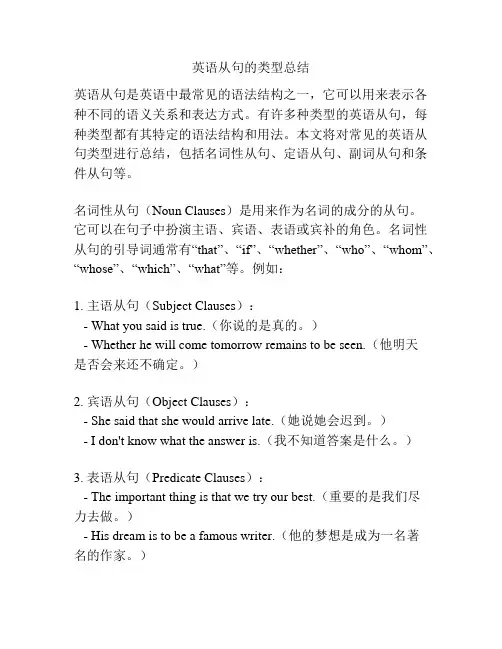
英语从句的类型总结英语从句是英语中最常见的语法结构之一,它可以用来表示各种不同的语义关系和表达方式。
有许多种类型的英语从句,每种类型都有其特定的语法结构和用法。
本文将对常见的英语从句类型进行总结,包括名词性从句、定语从句、副词从句和条件从句等。
名词性从句(Noun Clauses)是用来作为名词的成分的从句。
它可以在句子中扮演主语、宾语、表语或宾补的角色。
名词性从句的引导词通常有“that”、“if”、“whether”、“who”、“whom”、“whose”、“which”、“what”等。
例如:1. 主语从句(Subject Clauses):- What you said is true.(你说的是真的。
)- Whether he will come tomorrow remains to be seen.(他明天是否会来还不确定。
)2. 宾语从句(Object Clauses):- She said that she would arrive late.(她说她会迟到。
)- I don't know what the answer is.(我不知道答案是什么。
)3. 表语从句(Predicate Clauses):- The important thing is that we try our best.(重要的是我们尽力去做。
)- His dream is to be a famous writer.(他的梦想是成为一名著名的作家。
)4. 宾补从句(Complement Clauses):- I made a promise that I would help him.(我承诺会帮助他。
) - They declared him to be the winner.(他们宣布他是胜利者。
)定语从句(Adjective Clauses)是用来修饰名词或代词的从句。
它通常位于被修饰的名词或代词之后,并用来限定或描述该名词或代词。
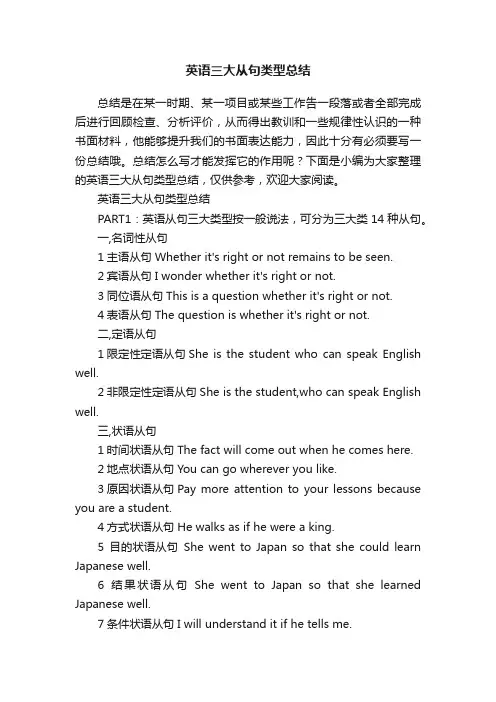
英语三大从句类型总结总结是在某一时期、某一项目或某些工作告一段落或者全部完成后进行回顾检查、分析评价,从而得出教训和一些规律性认识的一种书面材料,他能够提升我们的书面表达能力,因此十分有必须要写一份总结哦。
总结怎么写才能发挥它的作用呢?下面是小编为大家整理的英语三大从句类型总结,仅供参考,欢迎大家阅读。
英语三大从句类型总结PART1:英语从句三大类型按一般说法,可分为三大类14种从句。
一,名词性从句1主语从句Whether it's right or not remains to be seen.2宾语从句I wonder whether it's right or not.3同位语从句This is a question whether it's right or not.4表语从句The question is whether it's right or not.二,定语从句1限定性定语从句She is the student who can speak English well.2非限定性定语从句She is the student,who can speak English well.三,状语从句1时间状语从句The fact will come out when he comes here.2地点状语从句You can go wherever you like.3原因状语从句Pay more attention to your lessons because you are a student.4方式状语从句He walks as if he were a king.5目的状语从句She went to Japan so that she could learn Japanese well.6结果状语从句She went to Japan so that she learned Japanese well.7条件状语从句I will understand it if he tells me.8让步状语从句He knows a lot though he is little.PART2:经典名词性从句主语从句(subject clauses)在复合句中起主语作用的从句叫主语从句。

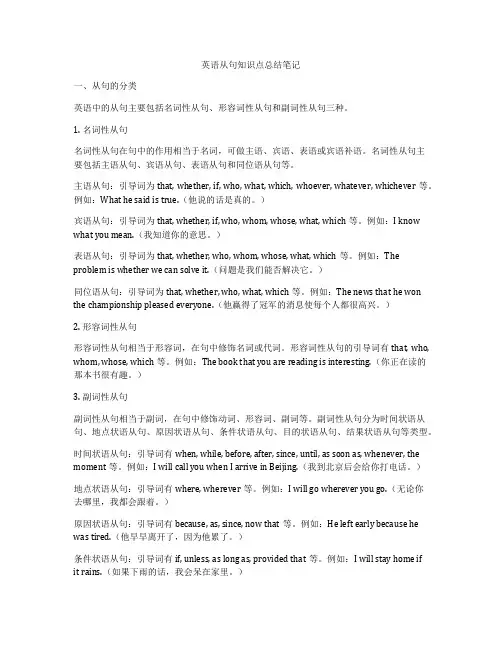
英语从句知识点总结笔记一、从句的分类英语中的从句主要包括名词性从句、形容词性从句和副词性从句三种。
1. 名词性从句名词性从句在句中的作用相当于名词,可做主语、宾语、表语或宾语补语。
名词性从句主要包括主语从句、宾语从句、表语从句和同位语从句等。
主语从句:引导词为that, whether, if, who, what, which, whoever, whatever, whichever等。
例如:What he said is true.(他说的话是真的。
)宾语从句:引导词为that, whether, if, who, whom, whose, what, which等。
例如:I know what you mean.(我知道你的意思。
)表语从句:引导词为that, whether, who, whom, whose, what, which等。
例如:The problem is whether we can solve it.(问题是我们能否解决它。
)同位语从句:引导词为that, whether, who, what, which等。
例如:The news that he won the championship pleased everyone.(他赢得了冠军的消息使每个人都很高兴。
)2. 形容词性从句形容词性从句相当于形容词,在句中修饰名词或代词。
形容词性从句的引导词有that, who, whom, whose, which等。
例如:The book that you are reading is interesting.(你正在读的那本书很有趣。
)3. 副词性从句副词性从句相当于副词,在句中修饰动词、形容词、副词等。
副词性从句分为时间状语从句、地点状语从句、原因状语从句、条件状语从句、目的状语从句、结果状语从句等类型。
时间状语从句:引导词有when, while, before, after, since, until, as soon as, whenever, the moment等。
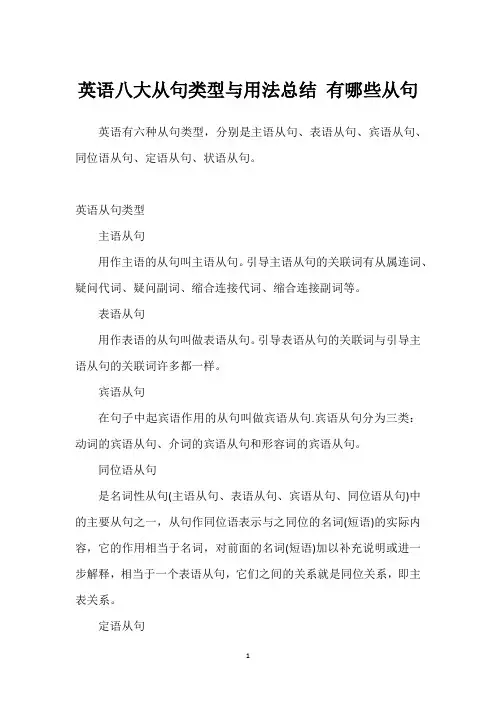
英语八大从句类型与用法总结有哪些从句英语有六种从句类型,分别是主语从句、表语从句、宾语从句、同位语从句、定语从句、状语从句。
英语从句类型主语从句用作主语的从句叫主语从句。
引导主语从句的关联词有从属连词、疑问代词、疑问副词、缩合连接代词、缩合连接副词等。
表语从句用作表语的从句叫做表语从句。
引导表语从句的关联词与引导主语从句的关联词许多都一样。
宾语从句在句子中起宾语作用的从句叫做宾语从句.宾语从句分为三类:动词的宾语从句、介词的宾语从句和形容词的宾语从句。
同位语从句是名词性从句(主语从句、表语从句、宾语从句、同位语从句)中的主要从句之一,从句作同位语表示与之同位的名词(短语)的实际内容,它的作用相当于名词,对前面的名词(短语)加以补充说明或进一步解释,相当于一个表语从句,它们之间的关系就是同位关系,即主表关系。
定语从句是由关系代词或关系副词引导的从句,其作用是作定语修饰主句的某个名词性成分,相当于形容词,所以又称为形容词性从句,一般紧跟在它所修饰的先行词后面。
状语从句可分为:时间状语从句、地点状语从句、缘由状语从句、条件状语从句、目的状语从句、让步状语从句、比较状语从句、方式状语从句、结果状语从句。
英语从句用法1.主语从句1)主语从句可直接位于主语的位置,假如从句较长,谓语又较短,可用it作形式主语,而将从句放在句末。
常见的句型有:2)what引导的主语从句表示“...的东西时”,一般不用it作形式主语。
3)what,who,when,why,whether等词含有各自的疑问意义,但它们引导的主语从句,都用陈述语序。
2.宾语从句1)宾语从句可位于及物动词、介词和某些形容词后。
连词that 常可省略。
介词后一般接疑问词引导的宾语从句。
in that(由于),except that(除了),but that(只是)已构成固定搭配,其他介词后一般不接that引导的宾语从句。
2)宾语从句后如有宾补,要用形式宾语it来代替,而把宾语从句移至宾补之后。
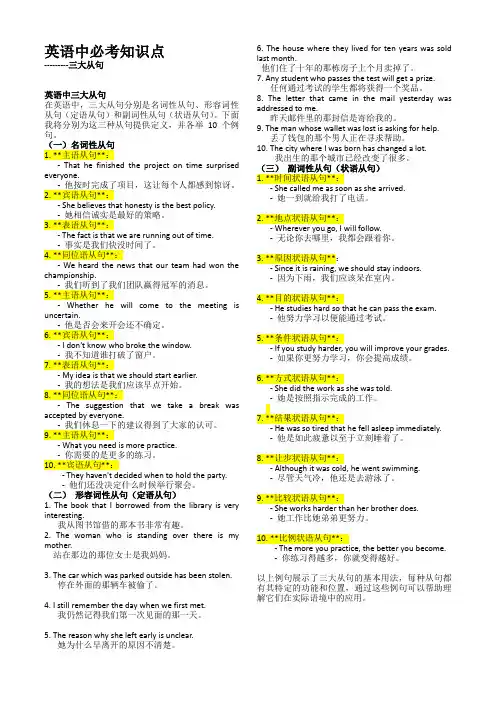
英语中必考知识点---------三大从句英语中三大从句在英语中,三大从句分别是名词性从句、形容词性从句(定语从句)和副词性从句(状语从句)。
下面我将分别为这三种从句提供定义,并各举10个例句。
(一)名词性从句1. **主语从句**:- That he finished the project on time surprised everyone.- 他按时完成了项目,这让每个人都感到惊讶。
2. **宾语从句**:- She believes that honesty is the best policy.- 她相信诚实是最好的策略。
3. **表语从句**:- The fact is that we are running out of time.- 事实是我们快没时间了。
4. **同位语从句**:- We heard the news that our team had won the championship.- 我们听到了我们团队赢得冠军的消息。
5. **主语从句**:- Whether he will come to the meeting is uncertain.- 他是否会来开会还不确定。
6. **宾语从句**:- I don't know who broke the window.- 我不知道谁打破了窗户。
7. **表语从句**:- My idea is that we should start earlier.- 我的想法是我们应该早点开始。
8. **同位语从句**:- The suggestion that we take a break was accepted by everyone.- 我们休息一下的建议得到了大家的认可。
9. **主语从句**:- What you need is more practice.- 你需要的是更多的练习。
10. **宾语从句**:- They haven't decided when to hold the party.- 他们还没决定什么时候举行聚会。
一. 宾语从句object clause:一. 定义definition:在句子中起宾语作用的从句叫做宾语从句。
二. 连接词connections:that: I think that you can pass the exam.Whether/if: I don’t know what the word means.“Wh”: I don’t know what the word means.I don’t know where he found the book.只用whether的情况:1. 与or not连用:I don’t know whether it’s raining or not.2. 与动词不定式连用:He doesn’t know whether to accept the invitation.3. 连接词前有介词时:It depends on whether he is coming.三. 时态tenses:1. 主句是一般现在时态,从句根据实际情况而定(各种时态均可)She wants to know what he has done for the exam.2.主句是一般过去时态,从句用相应的过去的时态。
1)She said that she was a student.2)She said that she would fly to Japan in a week.3)She said that she had finished her homework already.3. 如果宾语从句说的是客观真理、自然现象或事实时,这时宾语从句要用一般现在时态。
The teacher said that the earth goes round the sun.二. 定语从句Attributive clause:1.定义:在复合句中修饰名词、代词的从句叫定语从句2.先行词指人who /that先行词指物which/ that3. 定语从句一般紧跟被修饰的名词或代词(即先行词)后4.关系代词代替先行词在句子中担当成分,所以从句中不可再出现其他代替先行词的代词5.翻译方法“…. 的”Eg.1. Yesterday we bought a book which is really hard to understand.2. The students who are from Maple Leaf School like learning English.Whom: 先行词指人,则代替先行词在定语从句中充当宾语(包括介词的宾语), 与who的区别是如果前面带介词则必须用whom1.This is the teacher whom\who we like best.2. I don’t like the boy to whom you are talking.Whose : 指人或物,作定语,表示“…的”eg: Harry is the boy whose mother is our math teacher.关系代词只能that 的特殊情况:1.先行词前有序数词修饰时:This is the first gift that my parents bought me.2.先行词前有形容词最高级修饰时:This is the most exciting film that I have ever seen.3. 先行词是不定代词something, anything等时.e.g. Is there anything that you want in this shop4. 先行词是人和物时, 用that.e.g. He talked about some writers and books that were unknown to us all.5. 先行词被all , little , the only , the very(就是,正是), the last 等词修饰时,只能用thate.g. This is the last place that I want to visit.6. 特殊疑问句以who 或which 开头,只能用that引导.Who is the girl that is making a speech on the platform?当关系代词前使用介词时:物+介词+which ; 人+ 介词+ whom当关系代词前使用介词时:e.g. 1. This is the train by which we went to Beijing.2. This is the teacher to whom my mother is talking.三. 状语从句:Adverbial clauses定义:在复合句中由从句表示的状语称作状语从句,它可以用来修饰谓语(包括非谓语动词)、定语或状语,或是整个句子。
大一英语语法从句知识点语法从句在英语语法中扮演着重要的角色,能够丰富句子的结构和意义。
掌握好语法从句的使用方法可以提高我们的写作和口语表达能力。
本文将介绍几个大一英语学习过程中常见的语法从句知识点,并详细讲解其用法和例句。
一、名词性从句名词性从句可以在句子中充当主语、宾语、表语或同位语。
常见的名词性从句有:宾语从句、主语从句、表语从句和同位语从句。
1. 宾语从句宾语从句通常作为主句的宾语,用来回答“what, where, when, why, how”等疑问词。
宾语从句的引导词有:that, whether/if及连接代词和连接副词。
例句:I don't know where he went yesterday.(我不知道他昨天去哪儿了。
)He asked me if I could help him with the project.(他问我是否能帮他完成这个项目。
)2. 主语从句主语从句位于句子主语的位置,引导词常常是“what, who, which, whether”等。
例句:What he said is true.(他所说的是真的。
)Whether we can go camping depends on the weather.(我们是否能去野营取决于天气。
)3. 表语从句表语从句用来解释或说明主语的身份、特征、状态等。
常用的引导词有:that, whether, who, which等。
例句:The important thing is that you are safe.(重要的是你平安。
)The question is whether he will come to the party.(问题是他是否会来参加聚会。
)4. 同位语从句同位语从句用来对某个名词或代词进行解释或说明。
常用引导词为:that, who, what等。
例句:The news that he passed the exam made us happy.(他通过了考试的消息让我们很高兴。
英语三大从句在英语中,主要有三大从句,即名词性从句(包括主语从句,宾语从句,表语从句,同位语从句)、形容词性从句(即定语从句)、副词性从句(即状语从句,包括时间、条件、结果、目的、原因、让步、地点、方式等)。
定语从句一、关系代词引导的定语从句关系代词代替前面的先行词,并且在定语从句中充当句子成分,可以作主语、宾语、定语等。
常见的关系代词有:who, that, which。
它们的主格、宾格和所有格如下表所示:(一)关系代词who, whom和whose的用法who代替人,是主格,在定语从句中作主语。
An architect is a person who designs buildings. 建筑师是设计房屋的人。
whom代替人,是宾格,在定语从句作宾语,在非正式英语常可省略。
Do you know the gentleman whom we met in the school library yesterday? 昨天我们在学校图书馆里遇到的那位先生你认识吗?whose一般代替人,有时亦可代替物,是所有格,在定语从句作定语。
The girl student whose father is a senior engineer used to study abroad. 其父是一位高级工程师的那个女学生过去在国外留学。
Do you know the name of the hotel whose window we can see here? 我们这儿能看到窗户的那个宾馆叫什么名字,你知道吗?(关系代词whose指代先行词hotel,正式用法应该用of which。
whose window=the window of which,意思是:the window of the hotel。
)(二)关系代词which的用法which代替物,在定语从句作主语或宾语,作宾语时还可省略。
I do not like stories which have unhappy endings.我不喜欢有不幸结局的小说。
英语的从句类型与用法总结资料英语的从句类型与用法总结资料1英语从句分类介绍从句体系包括:从句体系(从句系统)图示从句体系(从句系统)图示第一,名词性从句(主语从句、表语从句、宾语从句及同位语从句)第二,定语从句第三,状语从句分类从句不能单独成句,但它也有主语部分和谓语部分,是一个特殊句子,就像一个句子一样。
所不同在于,从句须由一个关联词引导。
根据从句语法功能的不同可分为:主语从句、表语从句、宾语从句、同位语从句、定语从句和状语从句6类。
前四类由于主语从句、表语从句、宾语从句及同位语从句在句子的功用相当于名词,所以通称名词性从句;定语从句功能相当于形容词,称为形容词性从句;而状语从句功能相当于副词,称为副词性从句。
状语从句还可以分为条件状语从句、原因状语从句、地点状语从句、目的状语从句、让步状语从句、比较状语从句、方式状语从句、结果状语从句和时间状语从句。
主语从句(Subject Clause)用作主语的从句叫主语从句。
引导主语从句的关联词有从属连词、疑问代词、疑问副词、缩合连接代词、缩合连接副词等。
表语从句(Predicative Clause)用作表语的从句叫做表语从句。
引导表语从句的关联词与引导主语从句的关联词很多都一样。
宾语从句(Object Clause)在句子中起宾语作用的从句叫做宾语从句.宾语从句分为三类:动词的宾语从句、介词的宾语从句和形容词的宾语从句。
同位语从句是名词性从句(主语从句、表语从句、宾语从句、同位语从句)中的主要从句之一,从句作同位语表示与之同位的名词(短语)的实际内容,它的作用相当于名词,对前面的名词(短语)加以补充说明或进一步解释,相当于一个表语从句,它们之间的关系就是同位关系,即主表关系。
定语从句是由关系代词或关系副词引导的从句,其作用是作定语修饰主句的某个名词性成分,相当于形容词,所以又称为形容词性从句,一般紧跟在它所修饰的先行词后面。
状语从句可分为:时间状语从句(adverbial clause of time)地点状语从句(adverbial clause of place)原因状语从句(adverbial clause of cause)条件状语从句(adverbial clause of condition)目的状语从句(adverbial clause of purpose)让步状语从句(adverbial clause of concession)比较状语从句(adverbial clause of comparison)方式状语从句(adverbial clause of manner)结果状语从句(adverbial clause of result)2英语八类状语从句的用法归纳一、概说状语从句即指在主从复合句用作状语的从句。
英语从句大全宾语从句:1,界说:宾语从句是指在复合句中做及物动词的宾语的从句,也可以作介词和某些形容词的宾语.宾语从句一般用于及物动词之后,或用于介词之后.2,表示情势:A 及物动词后的宾语从句(1)有从属连词引诱I think (that) watching TV too much is bad forpeople’s health.我以为看太多电视对身材有害.Recent court decisions have ordered that public schools take the necessary steps to provide that education.比来的法院判决责令公立黉舍采纳须要步调供给那种教导.I don’t know if other clients are going to abandonme,too.我不知道其他顾客是否也会摈弃我.(2)有衔接代词引诱This test is intended to reinforce what you have learnt in the past few weeks.此次测验的目标在于巩固你们在曩昔几周所学的常识.You may never find out who dealt with the complaint later.事后你可能无法知道谁处理的投诉.It is your task to find out into which of the two kinds of jobs you fit.你的义务是搞清晰,这两种工作你合适哪种.(3)有衔接副词引诱There are still no forecasts for when faster-than-light travel will be available.对于超光速观光何时能实现,今朝还没有做出预感.We can’t understand why he avoided speaking to us.我们不睬解他为什么不跟我们措辞.They know exactly where they are going.他们清晰地知道本身的行动偏向.We need to understand how the normal cell controls itself. (how暗示方法)我们须要懂得正常细胞是若何自我控制的.We do not know how far mankind will be able to solve these problems.(how暗示程度)我们不知道人类可以或许把这些问题解决到什么程度.特别提醒:假如主句谓语是think,believe,suppose,imagine 等,宾语从句中的否认意义平日在主句中表示出来,称为“否认转移”.例如:I don’t think this is the best way.我以为这不是最佳办法.当宾语从句作介词的宾语时,不克不及用if引诱,而只能用whether.Our basic difference of opinion concerns the question of whether or not the city as such to be preserved.一个根本的看法不合涉及的问题是,像今朝如许的城市是否还要保存下去.B 介词和某些形容词之后的宾语从句(1)介词后的宾语从句He only laughed at what I said.对我的话他只是笑.I always think of how I can improve my spoken English.我经常斟酌若何才干进步我的英语白话.(2)某些形容词后的宾语从句I’m afraid that I can’t go with you.我生怕不克不及和你们一路去了.I am sure that they will make greater progress in English through hard work.我确信,经由过程艰难尽力他们将在英语方面取得更大的进步.(3)非谓语动词之后的宾语从句Reading that it was just a difference in custom, the foreigner smiled and said nothing.这个外国人知道了这只是风气的不合后,就笑了笑,没说什么.On being asked whether he had any good food in Germany, he answered ”Terrible”.一问到他在德国事否吃过什么佳肴,他就答复说:“糟糕的很”.(4) 用it作情势宾语的宾语从句罕有的表达包含:have it that (说);insist on(或upon)it that (果断主意,果断请求);make it clear that(标明);see to that (确保);take it that (以为);等等.I insist upon it that we should be honest.我果断主意我们应当说谎.I take it that you don’t want to do it ,but you haveto.我以为你不想做这件事,但你必须要做,.The rapid development of laser techniques in the past ten years has made it clear that the future is likely to be very exciting.曩昔十年激光技巧的敏捷成长已经标明,将来可能是令人鼓舞的.Rumor has it that more than 20books on creationismand evolution are in the publisher’s pipeline.传闻说,有20多本关于神造说与进化论之争的书本正在出版.(in the publisher’s pipeline.在进行中,在临盆中)There are those who consider it questionable that these defense-linked research projects will account for an improvement in the standard of living or, alternately, do much to protect our diminishing resources.有些人以为这些国防研讨项目将带来生涯程度的改良,或者对呵护我们日益削减的资本做出重大进献是值得疑惑的.表语从句:1,界说:表语从句是指在复合句中做主句表语的从句.表语从句和主语只统一内容,它对主语进行解释.解释,是主语的内容具体化.2,表示情势:A 由从属连词引诱The clear message is that we should get moving to protect ourselves.译:传达的信息一览无余:我们应当行动起来呵护我们本身.The reason I didn’t go to France was that I got a new job.译:我之所以没去法国事因为我找到一份新工作.特别提醒:下列表达式不规范的:The reason I didn’t go to France was because I got a new job .因为because 不克不及引诱名词性从句.The question is whether he works at all.译:问题在于他是否工作.特别提醒:下列表达是错误的:The question is if he works at all .因为if不克不及引诱表语从句.B 有衔接代词引诱China is not what it used to be .译:中国不再是曩昔的样子了.Raw material is what we are badly in need of .原材料是我们急需的.C 有衔接副词引诱The next important question we have to decide is when we have to submit the annual report.我们必须决议的下一个问题是,是么时刻我们必须呈交年度陈述.Some people maintain that this is precisely where the danger lies.有些人保持以为这恰好是安全地点.This is why I didn’t pass the exam.这就是我测验不合格的原因.D A is to B what C is to D 这是一种涉及表语从句特别情势的句型,所表达的根本意义为“A之于B 正如C之于D”.前落后行类比,经由过程解释 C 对于D 的主要性,目标在于凸起A对于B 的主要性.The pen is to a writer what the gun is to a soldier.笔对于作家正如枪对于士兵.Air is to us what water is to fish.空气对于我们正如同水对于鱼儿.Reading is to the mind what food is to body.念书对于思惟就如同食物对于身材.主语从句:1,界说,主语从句是指在复合句中做主句主语的从句.2,表示情势:A 由从属连词(that whether if )引诱That the plates are moving is beyond dispute.译:板块在活动,这是无可置疑的.特别提醒:不克不及如许表达:The plates are moving is beyond dispute. 尽管that没有现实寄义,但它起到引诱主句的功效,在这里不成或缺,不然句子构造会消失凌乱.That our environment has little, if anything ,to do with our abilities ,characteristics and behavior is central to that theory .译:这种理论的焦点是,我们的情况同我们的才干,性情特点和行动即使有什么关系的话,也是微缺少道的.Whether she will come or not is still a question .译:她是否来仍然是个疑问.Whether the results will be valuable ,meaningless ,or even misleading depends partly upon the tool itself but largely upon the user .译:成果毕竟是有价值的,照样无意义的,甚至是误导的,这在部分程度上取决于对象本身,但在很大程度上取决于应用者.特别提醒,whether 引诱的主语从句位于句首时,不克不及有if 代替.B 由连词代词引诱Who will go to the energy conference is not important.(疑问分句作主语)谁将去介入能源会议其实不主要.What he wanted to see was an end to all the armies of the world .他想看到的是世界上一切部队的灭亡.C 由连词副词引诱How he manages to finish the job is of interest to us all.他若何设法完成这项工作的,我们对此都很感兴致.Why he failed the English exam wasn’t clear.还不清晰他为什么没有经由过程英语测验.When they will leave for Beijing is not yet decided.他们什么时刻出发去北京还未肯定.D 用it 作情势主语因为主语从句位于句首会使句子显得头重脚轻,一次常把它移到句子的后部,句首用引诱词it 来做情势主语.It is our hope that the two sides will work towards peace.我们愿望两边朝着和平的偏向尽力.It doesn’t matter whether Mary comes to party or not.玛丽是否来介入聚首是没有多大关系.特别提醒:当whether引诱主语从句位于句尾时,whether可以有if 代替,但if 平日不克不及与or not 搭配,如本句也可以表达为It doesn’t matter much if Mary comes to party.It makes no difference what you read or study if you can’t remember it假如你记不住,那么你读什么或者学什么都不主要了.E 两个从句配合做主语Whether such a sense of fairness evolved independently in capuchins and humans ,or whether itstems from the common ancestor that the species had35 million years ago ,is ,as yet ,an unansweredquestion .译:这种公正意识是在卷尾猴和人类身上各自自力成长而来,照样来源于两个物种在3500万年前的配合祖先,迄今为止仍然是个悬而未决的问题.(注:因为两个主语从句是选择关系,所以谓语动词用单数情势)It is imagined by many that the operations of the common mind can be by no means compared with those of the scientists’minds ,and that they have to be acquired by a sort of special training .很多人以为,广泛人的思维方法根本无法与科学家的思维进程比拟;科学家的思维进程必须经由某种专门练习才干控制.。
英语中从句包括:名词从句、定语从句、同位语从句和状语从句.一、名词从句包括主语从句、宾语从句和表语从句.(一)主语从句考试重点:主语从句常用的连词的用法;it is desirable that引导的主语从句的用法.在句子中担当主语的是一个从句,这个从句就叫主语从句.主语从句可以由下列连词、连接代词和连接副词引导,且不能省略.连词:that,whether 连接代词:what,whatever,who,whoever等.连接副词:when,where,how,why1、由连词that,whether引导的主语从句.连词that,whether在主语从句中的作用只是引导主语从句,它在从句中不担任成分,不能省略,且由它们引导的主语从句,多用it做形式主语.(1)_____ was unimportant.A. Whether he enjoyed our dinner or notB. No matter how he enjoyed our dinnerC. If he enjoyed our dinnerD. What he enjoyed our dinner2)That the earth is round is true.(It is true that the earth is round.)地球是圆的,是个事实.2、由连接代词和连接副词引导的主语从句它们分别在从句中担任主语、宾语和状语,不能省略.注意翻译时不能把它们译为疑问句.由它们引导的主语从句,也可以用形式主语it引导.(1)Who let out the news remained unknown.(It remained unknown who let out the news.)谁泄露了那个消息仍旧无人知道.(2)When we’ll start is not clear.(It is not clear when we’ll start.)我们何时出发还不清楚.3、以连接代词what, whatever, whoever…引导的主语从句.What有时可以用来表示the thing which这种意思,引导从句,表示一样东西或一件事情.Who,whom,which,what,可以和ever构成合成词,和what一样引导从句,ever起强调作用.此类句子不能用形式主语it引导,它们在句子中担任成份,不能省略,语序为陈述句的语序.(1)_____ I saw was two men crossing the street.A. WhatB. WhomC. WhoD. That4、句型It is desirable (suggested, necessary, requested, ordered, proposed, urgent)+that+主语+should(可省略)+V(动词原形).(1)It’s urgent that a meeting _____ before the final decision is made.A. will be arrangedB. must be arrangedC. be arrangedD. would be arranged(二)表语从句考试重点:表语从句的基本用法;含有suggestion,proposal等词的表语从句的用法.1、在从句中做表语的从句叫表语从句.它位于主句中的系动词之后,常用的关联词和主语从句相同.(1)This is what he wants. 这就是他想要的东西.(2)The question is whether we can finish our work by tomorrow morning.问题是我们明天上午能否完成任务.2、用suggestion等词表示愿望、建议、命令等情绪时,用虚拟语气,从句中用should(可省略)+动词原形.(1)The general’s command was that the soldiers _____ their fort and carry out more important tasks.A. would leaveB. leaveC. leftD. have left(三)宾语从句考试重点:宾语从句用陈述句的语序;介词后面的宾语从句;suggest,insist,order,demand等动词后接宾语从句时,用虚拟语气;if和whether 的区别.1、宾语从句用陈述句的语序(1)Can you tell me _____ about the city that makes people love it so much?A. it is whatB. what it isC. what is itD. is it what2、介词后面的宾语从句(1)The people at the party were worried about Janet because no one was aware _____ she had gone.A. where thatB. of whereC. of the placeD. the place3、suggest,insist,order,demand等动词后作宾语时,表示欲望、建议、命令等时,用虚拟语气.①His mother insisted that he _____ the coat when going out.A. put onB. puts onC. to putD. putting on4、在下列情况下不能用if , 而用whether.后跟不定式:He didn’t tell me whether to go or stay. 他没有告诉我是走还是留下.前面有介词:He raised the question of whether we could find the necessary money.他提出我们能否筹集到必要的资金这个问题.引导主语从句:Whether they win or lose is all the same to me.他们胜利也好,失败也好,对我来说都是一样的.后面直接跟or not:I wonder whether I’ll catch the last bus or not.我不知道我能否赶上末班车.(四) 同位语从句常跟在fact,idea,news等名词的后面,通常用连词that引导.1、Would the news _____ he failed to pass the exam bother you?A. whichB. thatC. of whichD. on which2、I had no idea that you were here. 我没有想到你会在这里.如果同位语从句所修饰的先行词是suggestion,proposal等名词的时候,谓语动词用should+原形动词.should可以省略.1、My suggestion that we do the experiment again is accepted bythem.我的再做一次实验的建议被他们所接纳.2、His proposal that they(should)challenge the other groups to a friendly competition is praised by the teacher. 他提议他们和别的组挑战,来一场友谊竞赛.这个提议受到了老师的表扬.二、定语从句考试重点:限定性定语从句中关系代词的用法;关系副词when,where,why,引导的定语从句;带介词的定语从句;非限定性定语从句;“名词(代词)+介词+关系代词”引出,一般是非限定性定语从句.在复合句中起定语作用的从句叫做定语从句.定语从句分为两种:限定性定语从句和非限定性定语从句.注意关系代词和关系副词在从句中的应用.(一)关系代词who,whom,whose,which,that引导的定语从句1、The company official _____ I thought would be fired received a raise.A. whomB. whoeverC. whoD. of whom(二)关系副词when ,where, why, 引导的定语从句1、The time will come _____ man can fly to outer space freely.A. thatB. whenC. in thatD. which(三)关系代词前带介词的定语从句1、Before her marriage, she spent a considerable time in that very part of Shanghai, _____ she belonged.A. whichB. to whereC. to whichD. at which(四)非限定定语从句对被修饰的名词起附加说明,或进一步描述或补充.这种从句有一定的独立性,即使去掉,主句的意思仍然完整,只是内容相对地不够具体.与主句之间常用逗号分开,所用的关系代词与限定性定语从句基本相同,但不能用关系代词that 引导.(1)An Old friend from abroad, _____I was expecting to stay with, telephoned me from the airport.A. thatB. whomC. whoD. which (五)“名词(代词)+介词+关系代词”引出,一般是非限定性定语从句.We’ve tested three hundred types of boot, _____is completely water proof.A. no of whichB. none of whichC. some of whichD. neither of which 考试重点:同位语从句的基本用法;含有suggestion,proposal等词的同位语从句.三、状语从句在主从句中起状语作用的从句叫状语从句.常见的状语从句有时间、地点、条件、原因、让步、方式、比较、目的、结果.考试重点:状语从句的种类及一些连词的基本用法;让步状语从句;unless,supposed (that),whomever,whenever,wherever等连词的含义和用法.一)时间状语从句常用的连词有:when,whenever(无论什么时候),since,as,until,hardly…when,no sooner…than,as soon as,before,after,the moment,the minute(一…就…)1、No sooner had they got the goods covered up _____ it started raining hard.A. whenB. thanC. thenD. after二)条件状语从句常用if,unless(除非,如果不),as/so long as只要.1、_____ I’m mistaken, I’ve seen that man before.A. UnlessB. IfC. BecauseD. Provided三)、原因状语从句常用:because, as, since.如果表示必然的因果关系,一般用because引入;而since表示一种间接或附带的原因;用as 只是提一下.1、He cannot go to school because he is ill. 他因为生病不能上学.2、Everyone likes you as you are both kind and honest. 人人都喜欢你,因为你既和气,又诚实.四)让步状语从句常用though/although,as (尽管),even if/though,however,whatever,wherever,whoever,no matter how/what/who等.1、In short, _____ he lives, a man belongs to some society.A. whateverB. wheneverC. whicheverD. wherever2、_____, you must show your ticket to go into the cinema.A. No matter whoever you areB. Whomever you areC. Whoever you areD. No matter who are you五)方式状语从句常用as, just as, as if/though 等词.1、_____ was pointed above, this substance can be used as a substitute.A. ItB. ThatC. WhatD. As2、He talks as if he _____ everything in the world.A. knowsB. knewC. had knownD. would have known六)目的状语从句常用so that , in order that, lest (以免,以防), in case.1、I wrote it down _____ I should forget it.A. in caseB. in case ofC. in order thatD. for fear of2、I’ll give you my phone number, so that you can call me when you arrive here.我把我的电话号码告诉你,以便你到达这里后可以给我打电话.七)结果状语从句常用so…that, such…that They are _____ students that they all performed well in the nationwide examinations.专注于活动方案总结,小学初中高中试卷,可以编辑的文档,欢迎下载使用本文档来源网络,由于文档太多,审核有可能疏忽,如果有错误或侵权,请联系本店马上删除。
英语中几大从句的用法总结⒈主语从句⑴主语从句可直接位于主语的位置,如果从句较长,谓语又较短,可用it作形式主语,而将从句放在句末。
常见的句型有:*It is a fact\a pity\a question\good news that...*It seems\appears\happened\has turned out that...*It is clear\important\likely\possible that...*It is said\reported\estimated\has been proved that...*It is said that comic books create a connection between people of thesame generation.*It seems that the performance is very useful.⑵what引导的主语从句表示“...的东西时”,一般不用it作形式主语。
*What we lack is experience.⑶what,who,when,why,whether等词含有各自的疑问意义,但它们引导的主语从句,都用陈述语序。
*How the plan is to be carried out should be discussed again.*I did know why I felt like crying.⒉宾语从句⑴宾语从句可位于及物动词、介词和某些形容词后。
连词that常可省略。
介词后一般接疑问词引导的宾语从句。
in that(因为),except that(除了),but that(只是)已构成固定搭配,其他介词后一般不接that引导的宾语从句。
*I promised that I would change the situation.*All this is different from what American young peoplewould say about friendship.*He is certain that watching so much television is notgood for children.*This article is well-written except that it is a bittoo long.⑵宾语从句后如有宾补,要用形式宾语it来代替,而把宾语从句移至宾补之后。
*He has made it clear that he would not change hismind.⑶在think,believe,suppose,expect等动词后的宾语从句中,如果谓语是否定的,一般将否定词移至主句谓语上,宾语从句则变成肯定形式。
*He didn't think that the money was well spent.⒊表语从句⑴表语从句出现在结构为“主语+系动词+表语从句”的句子中。
表语从句除可用that,what,when,why,whether,how 等引导外,还可由because,as if(though)等引导。
that常可省略。
如主句主语为reason,只能用that引导表语从句,不可用because.*Perhaps the most important thing to remember is thatthere is no one common type of life in America.*The reason why so many people died there is that there were not enough food supplies.*It looks as if successful international culturalcommunication will make the world smaller.⑵宾语从句后如有宾补,要用形式宾语it来代替,而把宾语从句移至宾补之后。
*He has made it clear that he would not change hismind.4.同位语从句同位语从句用于对前面出现的名词作进一步说明,一般用连词that引导,由于先行名词的意义不同,也可用whether/who/when/Where/what/why/how等引导。
常见的先行名词有fact/idea/Belief/news/hope/conclusion/evidence/suggestion/order/Problem/report,/decision.有时由于谓语较短,将同位语从句位于谓语之后。
*She finally made the decision that she would jointhe fashion show.*I had no idea how many books I could borrow at atime.*The news came that their team had won thechampionship.5.定语从句【定语从句所修饰的先行词可以是名词或代词,也可以是一个句子。
定语从句通常位于先行词之后,由关系代词或关系副词引导】⑴限制性定语从句【限制性定语从句修饰先行词,对先行词起修饰作用,紧接先行词之后,无逗号,若省去,原句意思不完整。
引导定语从句的关系代词有who/whom/whose/which/that等who/whom/whose用于指人,whose有时也可指物,相当于of which;which用于指物;that既可指人也可指物,但只用于限制性定语从句中。
关系代词除了引导定语从句,替代先行词外,还在从句中担任主语、宾语、定语等】*The computers and cables which make up theInternet are owned by people and organizations.*Those who live alone or who are sick may have tro uble in getting close to other people.*The girl whose parents died in an accident is living with her grandmother.1)当先行词是all/anything/everything/something/nothing等不定代词或先行词前有first/last/any/few/much/some/no/only以及形容词最高级修饰时,只能用关系代词that引导从句。
*That is all that I've heard from him.*He's the first person that I'm going to interview this afternoon.2)在从句中作宾语的关系代词常可省略。
关系代词紧跟介词,作介词宾语时不可用that,只可用which或whom 引导从句,并且不可省略,但当介词位于宾语从句句末时,作为介词宾语的关系代词仍可用that,也可省略。
*This is one of those things with which we have toputup.*This is one of those things (which\that) we have toput up with.3)引导定语从句的关系副词有when/where/why等。
关系副词在从句中作状语,意义上相当于一个“介词+which”的结构。
*Even in comic books where(=in which) there are n o words,the stories are fully expressed through the drawings.*No one knows the reason why(=for which) he wasso angry that day.⑵非限制性定语从句【非限制性定语从句既可修饰先行词,也可修饰整个主句,起补充说明作用,与主句之间有逗号隔开,若省去,原句意思不受影响。
不可用that引导非限制性定语从句。
关系词不可省略】*Every object has a gravitational pull,which is rather like magnetism.⑶“介词+which\whom\whose”引导的定语从句【“介词+which\whom\whose”可引导限制性定语从句,也可引导非限制性定语从句,该结构中介词的选择取决于从句谓语动词的固定搭配,或先行词的习惯搭配】*This is the computer on which he spent all hissavings*It is written by a person with whom we are allfamiliar.⑷as引导的定语从句【as引导的定语从句主要用于“such...as”及“the same...as”的结构中,代替先行词是人或物的名词。
as引导非限制性定语句时,代替整个主句,从句可位于主句之前、之后或中间】*These are not such problems as can be easily solved.(as代替先行词problems)*As is mentioned above,no single company or group canControl what happens on the Internet.(as代替主语)6.状语从句⑴时间状语从句引导时间状语从句的从属连词和词组有:1)when/whenever/while/as/after/before/since/till/until/once等。
*We have learnt quite a lot about it since we camehere.2)as soon as/hardly(scarcely)...when/no sooner...th an/each(every) time/the moment/immediately(that)等。
*As soon as I sent an e-mail message,I receivedpositive responses.*The moment he heard the good news,he jumped with joy.⑵地点状语从句引导地点状语从句的连词是where,wherever.*Wherever she went,she took her little daughterwithher.⑶原因、结果和目的状语从句1)引导原因状语从句的连词有:because/as/since/now(that)/seeing that/considering that/in that等。